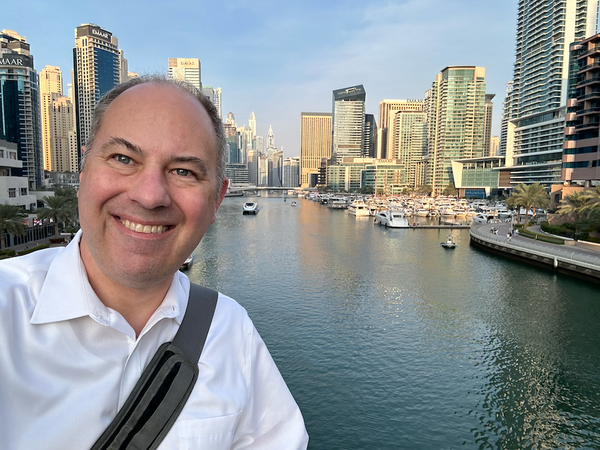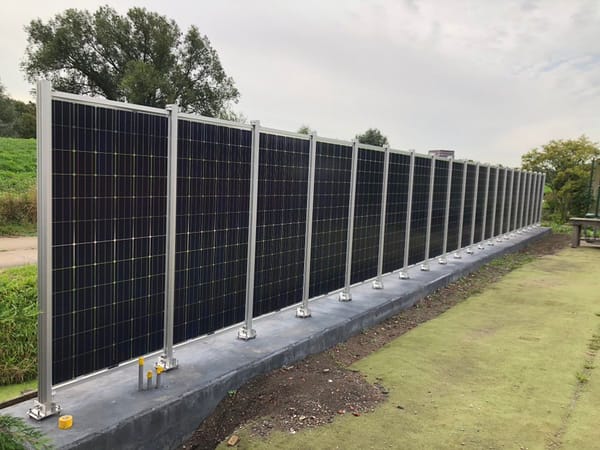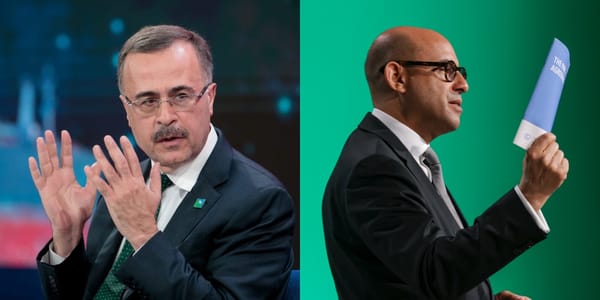Report from Dubai: A historic agreement to target fossil fuels
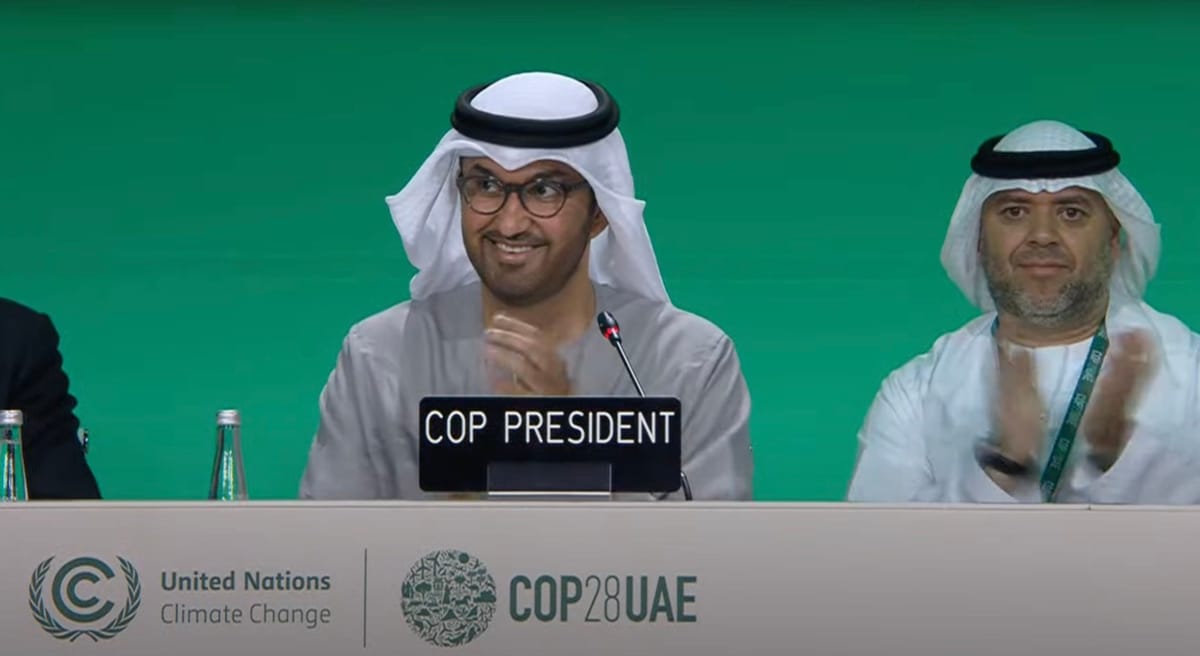
Good afternoon from Dubai,
For the first time ever, a U.N. climate statement includes specific mentions of fossil fuels, urgings to decrease their use, and climate finance dollar targets. After two days of intense diplomatic wrangling the agreement was remarkably approved within the first four minutes of the closing meeting, drawing a long ovation and cheers from delegates, who were exhausted by 14 days of negotiations.
Released shortly after 7:00 a.m., the main text, the Global Stocktake statement, is a massive, 21-page, 196 paragraph beast with references to almost every aspect of climate diplomacy. Throughout the previous night COP28 President Sultan Al Jaber and his staff reportedly shuttled between delegations in a series of bilateral meetings, asking countries to approve language – sometimes giving them a take it or leave it deal, depending on their political leverage.
While the measure was approved by consensus, perhaps the most dissatisfied group were members of the Alliance of Small Island States, who stayed out of the meeting room at the beginning of the meeting, only arriving after the delegations’ self-congratulations, to make a statement of disapproval – in particular because the approved text does not require specific decreases of fossil fuel use. The timing of their statement and absence suggests it was likely a coordinated diplomatic move so the text could pass under “consensus” while preserving AOSIS’ opportunity to object to the agreed upon text.
Some of the major aspects of the text (download here) are:
- The first time a climate agreement specifically mentions fossil fuels;
- However, it only deals with energy systems, ignoring fertilizer and plastic production;
- Instead of “phase out”, the text uses “transitioning away” for fossil fuels and provides no specific milestones for achievement;
- For coal, it weakens previous language and instead calls for a “phase-down of unabated coal power” but does not define the meaning of “abate”;
- Calls for “Phasing out inefficient fossil fuel subsidies”, although “inefficient” is undefined;
- A global target to triple renewables and double energy efficiency by 2030;
- Includes specific dollar goals for climate financing – but not for specific countries;
- Does not include any mention of “collective but differentiated goals”, a phrase that means developed countries are supposed to do more work but also gets China off the hook, since it is still considered “developing”;
- Recognizes the need to scale up adaptation finance beyond the current $40 billion target – but does not mention the $80 billion target developing countries wanted;
- Countries must develop new five-year national goals that aim to stay within 1.5°C;
- A follow up text creates a Collective Goal on Climate Finance, a first ever mechanism that aligns the many different finance projects. A committee on that Goal will meet and provide proposals for COP29 next year; and
- Includes language calling for “sustained reductions in global greenhouse gas emissions of 43 percent by 2030 and 60 per cent by 2035”.
Following the approval of the Stocktake text, countries lined up to provide their commentary on the result. Predictably, most developing countries were unhappy with the level of climate finance provided and the lack of fossil fuels “phase out” language.
“We have built a canoe with a weak and leaky hull,” said the head of the Marshall Islands delegation. “But we have to put it in the water, because we have no other option.”
In contrast, developed countries recognized the flaws, but lauded the results of the negotiations.
“Clearly many, many people here would have liked language about the need to begin peaking and reducing fossil fuels, but we know this was a compromise,” said the U.S.’s chief climate envoy John Kerry, who had reportedly pushed hard to add “phase out” to the final language.
“All nations of the world have acknowledged the future is in clean energy and the era of fossil fuels will come to an end,” said the head of the Australia delegation, who had been rumored to be working to weaken language on coal use.
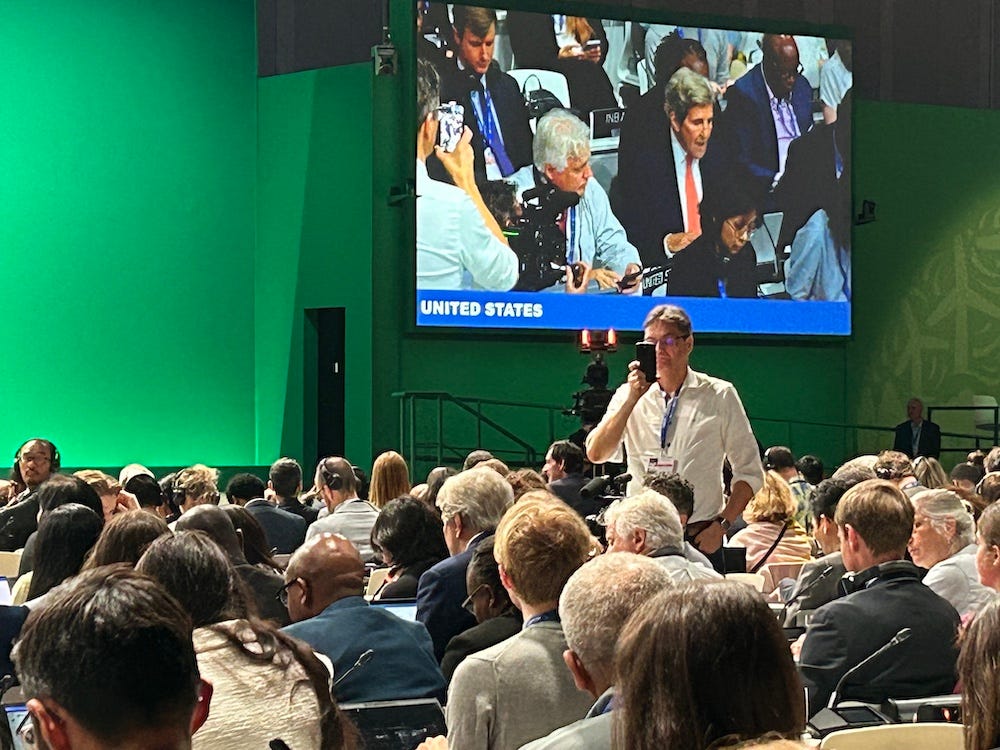
Kerry also made a bit of news during his statement, when he announced the U.S. and China plan to build upon the Sunnylands statement, “The U.S. and China both intend to update our long-term strategies and we invite other parties in doing so.” Perhaps this will be the beginning of the two countries regularly working together for annual emissions cuts.
COP28 President Al Jaber also took a victory lap after the acceptance of the Stocktake language.
“We have delivered a comprehensive response to the Global Stocktake and all other mandates. Together we have accepted realities and set the world on a new direction,” he said.
Al Jaber leaned into the irony that he, an oil company CEO, presided over a COP process that directly attacked fossil fuel use.
“We have language on fossil fuel in our final agreement for the first time ever!” he declared to broad applause from the delegates.
Carbon Credit Trading Stalls
Late last night negotiations were attempted one more time to resolve differences for the three Article 6 sections that would govern international carbon credit trading. However, according to observers the discussions were unsuccessful, and as a result texts sent to today’s plenary session kick discussions back to subsidiary bodies for further review at COP29. Without approval of rules under Article 6, international trading will continue to depend on scandal-ridden voluntary carbon markets.
Other Accomplishments
Every day reporters received a laundry list of financial and other commitments made at COP28. While none of these are ironclad, they are bigger pledges than ever made before, and are worth mentioning:
- $792 million in pledges to start the $100 billion Loss and Damages Fund;
- The launch of the $30 billion UAE Alterra climate investment fund;
- The The Oil and Gas Decarbonization Charter signed by 52 companies committing to zero methane emissions and ending routine flaring by 2030; and,
- Over $85 billion in climate funding was pledged during the meeting.
It’s also worth mentioning that after a fury of responses from climate activists Monday night, by this morning, activists were applauding the Global Stocktake text for being the first to target fossil fuels. In an early morning presser, a line up of activists were asked to grade the text, they gave it B, B-minus, and C-plus grades.
“We secured the first UN climate agreement that calls on all countries to ‘transition away from fossil fuels’,” said Romain Ioualalen from Oil Change International.
“The COP28 agreement marks a historic recognition from world leaders that a sharp turn away from fossil fuels toward clean energy in this critical decade and beyond, aligned with the science, is essential to meet our climate goals,” said Rachel Cleeetus from the Union of Concerned Scientists.
“The world has declared the end of the fossil fuel era at COP28,” said Catherine Abreu of Destination Zero.
A Political Assessment
From the start, the main narrative of COP28 was, “an oil company executive is running a climate conference”. Al Jaber never once dodged that narrative and instead chose to link his legacy to delivering results. The rapid approval of the Loss and Damage Fund within minutes of the start of COP28 set back some of his biggest detractors, especially climate activists, but it did not decrease the volume of their complaints, especially as the meeting was overrun by 2,400 fossil fuel executives and a first-ever OPEC pavilion on site.
Ultimately, it turned out that the oil company presence mattered less than the embedded interests of the negotiating parties: Large countries depend on fossil fuels to drive their economies, and their populations have not yet expressed an interest in giving up those fossil fuels. The fact that India and Australia mine a great deal of coal, turned out to matter as much as the fact that the U.S. is the world’s biggest oil producer. Those facts were barely part of discussion in the halls – unless you happened to talk to an Indian or Australian.
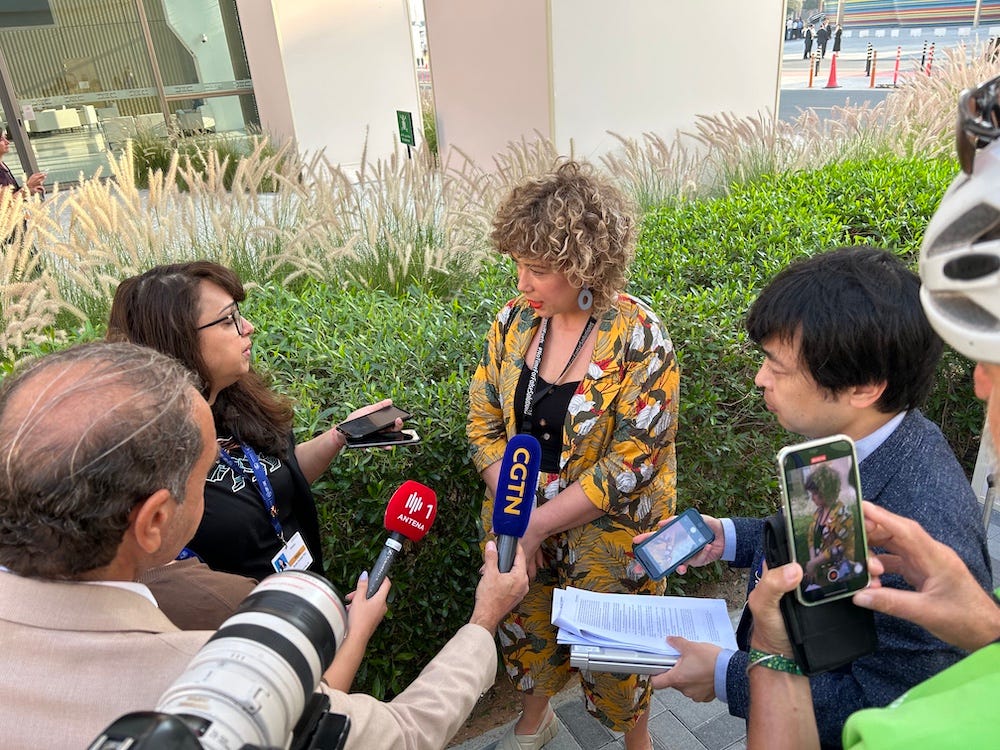
Also, as much as climate activists trumpeted the needs of indigenous peoples, the interests of developing countries were rarely monolithic. Bolivia, Uganda, and Cuba, in particular, were vocal about their country’s lack of interest in moving to green energy when fossil fuels were so much cheaper, and their economies desperately need more growth.
In addition, word was that Saudi Arabia – who worked on behalf of the 22-nation Arab League – was surprised at the determination of climate activists to get fossil fuel “phase out” language into the text. Late in the first week the Saudis began to throw elbows in every possible meeting, sometimes starting sudden open arguments, jamming up the works as they attempted to gain negotiation leverage at every opportunity.
Something climate activists never openly recognized is that elimination of fossil fuels is not only an existential threat to OPEC nation revenue, but also an existential threat to those countries’ social stability. Resisting the “phase out” language was a fight to the death for Saudi Arabia – regardless of how much damage climate change might to do small island nations.
Under those conditions, getting in a mention of fossil fuel “phase out” was an almost impossible goal. Yet, Al Jaber, reportedly with the support of the U.S. and China, managed to deliver a text that talks of fossil fuel “phase down” and “transitioning away”, an amazing accomplishment worthy of comparison to Richard Nixon’s trip to China.
More than anything, this COP has been a success for Al Jaber and the UAE. The meeting operated smoothly, the fossil fuel language was added, and developing world’s biggest priority – the operationalization and funding of the Loss and Damage Fund – got done before anything else. Truly, the Emiratis have positioned their country as a bridge between the Global North and South, while credibly preparing the country for a future after the fossil fuel era.
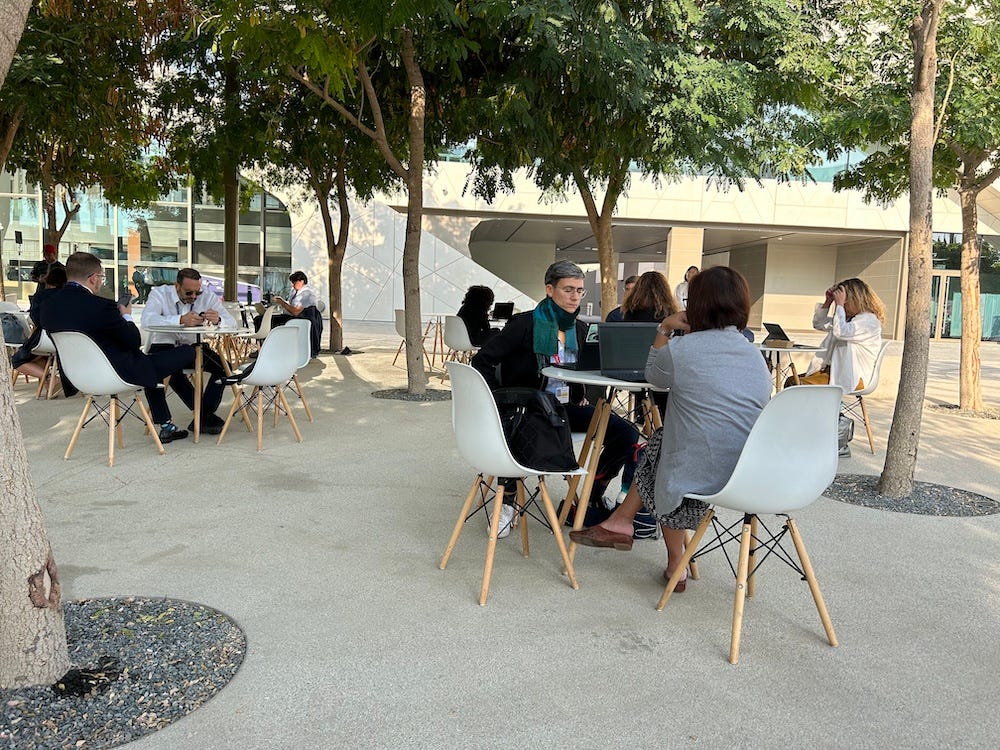
Next Up
Government’s climate staffers will meet in BonnΩ next June to work out the agenda for COP29. Already, it seems likely that countries will push to add more fossil fuel limitations to the agenda, commitments for climate financing, and rules for carbon trading. That last item has been on the agenda already for two years, so acceptance of its rules will become that much more important in 2024 to give international carbon trading some needed credibility.
In case you missed it, COP29 is scheduled for November 11-22, 2024 in Baku, Azerbaijan, while COP30 is planned for Belem, Brazil in November 2025. I’ve got to start making travel plans.
Thank you
The plenary meeting is still underway as I write this entry and will soon wrap up. For those of you who subscribed to this newsletter recently, it may surprise you that just four months ago I was not entirely sure I would head to Dubai. This newsletter came about as I began to investigate the quality of reporting on climate politics, and then the trip was supported by a Kickstarter and a small group of non-profit leaders who encouraged my vision.
To say that I’ve learned a few things in the process would be a vast understatement. I am tremendously grateful for the support of everyone who has read and underwritten this newsletter. The experience has been life changing but also given this entrepreneur a few ideas.
I’ll provide one more newsletter early next week, with further thoughts on the COP28 impact. Then, I’m going to take a break for the holidays where I plan to bake cookies and spend time with my family. Finally, in January I plan to produce a report on my findings on the coverage of climate politics. I will make that report available to a select group. If you are interested in reading it, please drop me a note at mike@fourcher.net. I’ll be glad to hear from you.
Right now, I’m going to go for a walk along the beach and touch the Persian Gulf for the first time I’m here. Then, I’m going to get a nice hotel dinner, rest up, and jump on a plane early tomorrow morning.
Signing off from Dubai.


